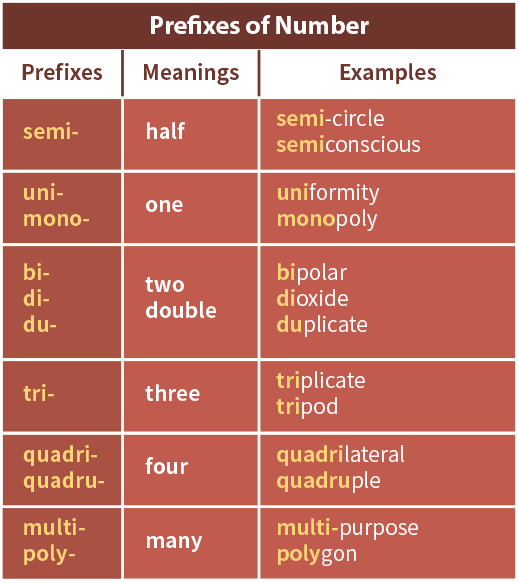Home > Chapter 2: Academic Vocabulary
2c: Word Formation
We often come across new words or technical terms in different subjects. An awareness of word formation processes enables us to work out the meaning of unfamiliar words in academic contexts.
This part will introduce the following common word formation processes:
i) affixation (prefixes and suffixes)
ii) compounding
iii) clipping
iv) blending
v) borrowing (loan words)
i) Affixation
Affixation is the most common way of making new words in English. An affix is a word element which can be added to alter the meaning or form of a root word. It usually comes in the form of either a prefix (which is put before the root word) or a suffix (which is put after the root word). The diagram below helps to illustrate this:

A prefix is a word element added to the beginning of the word to convey extra meaning. The table below shows some prefixes commonly seen in academic contexts and their meanings.


This part will introduce the following common word formation processes:
i) affixation (prefixes and suffixes)
ii) compounding
iii) clipping
iv) blending
v) borrowing (loan words)
i) Affixation
Affixation is the most common way of making new words in English. An affix is a word element which can be added to alter the meaning or form of a root word. It usually comes in the form of either a prefix (which is put before the root word) or a suffix (which is put after the root word). The diagram below helps to illustrate this:

A prefix is a word element added to the beginning of the word to convey extra meaning. The table below shows some prefixes commonly seen in academic contexts and their meanings.


 Activity 4
Activity 4
Identify the meanings of the common prefixes with reference to the examples provided. Choose the correct answers. Each answer can be used ONCE only.
| A. all | B. badly/wrongly | C. with/together |
| D. removing/away | E. again | F. not |
| G. outside | H. over/too much | I. more than |
| J. against | K. before/front |
| Prefixes | Examples | Meanings | |
|---|---|---|---|
| e.g. | re- | regain, restore, rebuild | E. again |
| 1 |
co- com- con- |
co-ordinator, co-operate, co-exist combination, compile converge, conglomeration |


|
| 2 | de- | decolonisation, deforestation, dehydrate |


|
| 3 |
anti- counter- |
anti-social, antibiotic, anti-clockwise counter-argument, counteract |


|
| 4 |
mis- mal- dys- |
miscarriage, mislead, mismatch malfunction, malnutrition dysfunctional, dysgenesis |


|
| 5 |
un- dis- il- in- im- ir- |
untrue, unemployed, unethical disloyal, discontinue, disagree illegal, illogical inappropriate, incomplete, indirect, inhumane immoral, immortal, immature irrelevant, irresponsible, irregular |


|
| 6 | fore- | foresight, forecast, foreground, forelegs |


|
| 7 | hyper- | hypertension, hyperactive |


|
| 8 |
ex- extra- |
external, exterior extraterrestrial, extra-curricular |


|
| 9 | omni- | omnivore, omniscient, omnipotent |


|
| 10 | out- | outnumber, outperform, outweigh, outlive |


|


